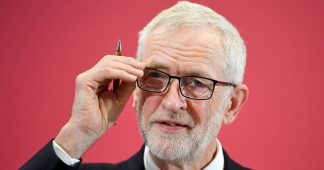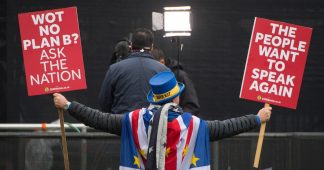SOLOMON HUGHES picks apart some revealing comments by the head of comms at the People’s Vote campaign
KEIR STARMER blithely announcing “Make Brexit Work” as Labour’s policy makes it look like his previous commitment to reversing Brexit was both very shallow and aimed at replacing the previously left-wing Labour leadership rather than the nation. A policy that won the right back control of the Labour Party, even as it heavily contributed to the 2019 election defeat.
More confirmation that the whole reverse-Brexit People’s Vote campaign was, for some top people, “a stick with which to beat the Labour Party” and “an anti-Corbyn thing” comes from one of the top figures in the People’s Vote campaign itself.
UK In A Changing Europe, a research institute based at King’s College London focusing on Britain-EU relations, is building an archive of interviews of major players in the various Remain and Leave campaigns: the interviews are invaluable and revealing on the People’s Vote.
Tom Baldwin, who was head of communications at the People’s Vote campaign, told them: “There was always an issue about how much the People’s Vote campaign should be a stick with which to beat the Labour Party rather than a neutral instrument for just winning a people’s vote.
“I was trying to maintain some strategic discipline around the latter but there were constantly people who wanted it to be an anti-Labour thing, an anti-Corbyn thing, a realignment thing, a Liberal Democrat thing, a proportional vote thing.
“I think those were all distractions and the more we did it the more we just confirmed some people in their view that we were a liberal elitist, metropolitan organisation that was playing at politics.”
Baldwin was particularly drawing attention to Roland Rudd: he is a City lobbyist and the brother of top Tory Amber Rudd.
The “People’s Vote” was not a typical grassroots campaign, and was instead built from the top, by lobbyists and multimillionaire donors.
Roland Rudd effectively controlled one of the main organisations in the People’s Vote campaign, an organisation called Open Britain.
Baldwin also pointed to Rudd’s ally, Hugo Dixon: he says these two figures wanted to use the People’s Vote campaign to “realign” politics.
At that time Labour’s leader was the very left-wing Jeremy Corbyn, supported by a large number of members and a surprisingly good “second-place” result in the 2017 election.
Baldwin suggests people like Rudd and Dixon wanted to use the campaign to “realign” politics away from the left back to the centre.
Baldwin said the “big strategic difference was over the extent to which we wanted to win a People’s Vote and then win a referendum, or whether we wanted to use this extraordinary energy that we had built up to realign politics.
“I was in the former group. I understand why, but The Independent Group (TIG) and the Liberal Democrats, and indeed the SNP in a different way, sometimes saw the instability we were helping to cause in a political system and within Parliament as an opportunity for them.”
Baldwin says: “That sort of strategic tension was very clear by the end, because I think people like Roland Rudd and Hugo Dixon were of the view that we should be part of a realignment process.”
It is pretty much an open secret that many central figures in the People’s Vote campaign saw the whole business as more about rebuilding “centrist” politics, which was in a weak position in a polarised politics of the time.
Labour renegades like Chuka Umunna and Tories like Anna Soubry saw their careers dwindling, and sought to revive them by a mix of new parties and the anti-Brexit campaigns.
Since making the comments, Baldwin has tried to downplay them. First, he has tried to suggest Rudd and his friends were not central to the People’s Vote campaign.
But Rudd was in fact so central that he was able to turn the campaign off just before the election in 2019: Rudd controlled the bank accounts.
When Labour was finally persuaded to adopt a “second referendum” policy, Rudd used his control to end the campaign, sacking key staff, so the People’s Vote would not actually campaign in the 2019 election.
It looked like a crude trap: Labour was persuaded to adopt an electorally disastrous policy, then left to crash without support by the people who did the persuading.
I also think Baldwin is wrong to draw the hard line between the people like Rudd, who wanted “realignment” towards a new centrist party like TIG, and the many people involved in the campaign who wanted realignment within Labour, away from Corbyn.
There is no hard barrier between the two: many Labour centrists hoped a successful new centrist party or Lib Dem revival would also pull Labour back to the centre.
Baldwin says that he “took advice from people who had fought and won elections like Alastair Campbell, Peter Mandelson” and Tony Blair about how to run the campaign, contrasting them to Rudd and Dixon.
But Campbell was perfectly happy to recommend a vote for the Lib Dems. Mandelson and Blair were certainly highly motivated by the urge to ditch Corbyn and pull Labour back to the centre.
The observable behaviour of the People’s Vote shows how it was focused on winning leadership within the Labour Party, not within the country.
Several Labour MPs and campaigners who gave interviews for the UK In A Changing Europe complain the People’s Vote campaign focused only on changing MPs’ minds, rather than voters’ minds.
The campaign did not hold significant rallies outside London or put much effort into winning over the majority of voters who did not want a second referendum.
It heavily focused on winning the leadership of the Labour Party. It gave platforms for “moderate” or “centrist” MPs to act like they were radical, while putting them behind a campaign actually arguing for the status quo.
It diverted Labour from it’s “Corbynite” left-wing, populist themes. And it lumbered Labour with a policy that ensured the party would be defeated in the face of Boris Johnson’s “Get Brexit Done” election campaign.
Published at www.morningstaronline.co.uk
We remind our readers that publication of articles on our site does not mean that we agree with what is written. Our policy is to publish anything which we consider of interest, so as to assist our readers in forming their opinions. Sometimes we even publish articles with which we totally disagree, since we believe it is important for our readers to be informed on as wide a spectrum of views as possible.











